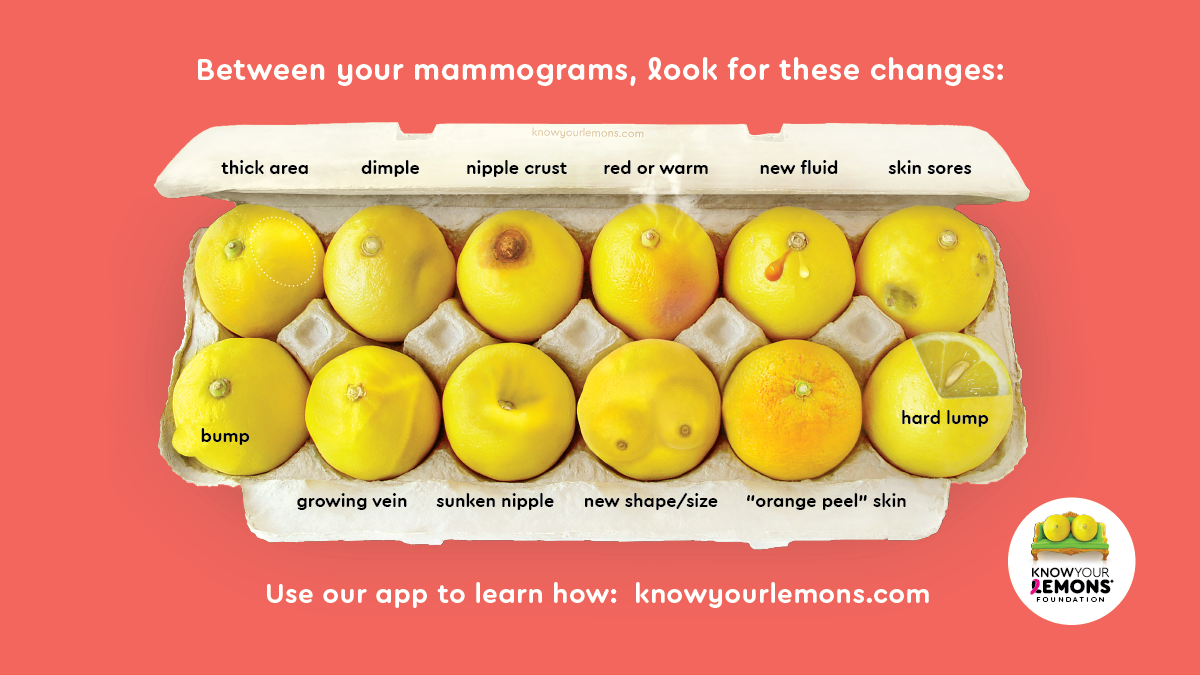BREAST HEALTH
Breast cancer is common, affecting 1 in 7 Australian women. So it is important for all women to be proactive in breast health.
1. Know Your Risk
- Talk to both sides of your family to learn about your family health history.
- Calculate your personal risk of breast cancer with iPrevent. iPrevent is a free online tool that calculates your 10-year and residual lifetime risk for breast cancer based on your family cancer history, lifestyle and reproductive risk factor information. It also provides personalised advice on breast cancer screening and lifestyle change suggestions.
2. Know What Is Normal For You
- Check your breasts regularly so that you are familiar with how your breasts normally look and feel, and are more likely to notice any unusual changes. The Know Your Lemons diagram shows the 12 signs of breast cancer to look and feel for.
3. Get Screened
- Have a screening mammogram every 2 years starting from age 40.
- Talk to your doctor about additional screening tests (ultrasound or MRI breasts) if you are at higher risk of breast cancer.
4. Make Healthy Lifestyle Choices
While not all breast cancers can be prevented, research shows that certain lifestyle choices can significantly lower your risk. These 5 have the strongest evidence behind them:- Maintain a healthy weight. Carrying extra body fat can raise oestrogen levels and increase inflammation - both linked to a higher risk of breast cancer. Large studies show that women who maintain a healthy, stable weight have about a 20-40% lower risk that those who gain a lot of weight in adulthood.
- Exercise regularly. Physical activity helps balance hormones, reduce inflammation and support a healthy weight. Aim for at least 150 minutes of moderate activity each week - even brisk walking counts. Women who are regularly active have a 10-20% lower risk of developing breast cancer.
- Limit alcohol. Alcohol increases oestrogen levels and can damage DNA in cells - both of which can lead to breast cancer. Even small amounts can raise risk. Women who drink 1 alcoholic drink per day have about a 7-10% higher risk than non-drinkers. At 2 to 3 drinks per day, the risk goes up to 20%. The less you drink, the lower your risk - and avoiding alcohol altogether offers the most protection.
- Eat a balanced, plant-rich diet. Eating plenty of vegetables, fruit, whole grains and healthy fats can help reduce inflammation and keep hormones in balance. Diets like the Mediterranean diet, which focus on plant-based foods and healthy oils, have been linked to a lower risk of breast cancer and other chronic diseases.
- Quit smoking. Smoking raises the risk of breast cancer, especially if you started young. It can also affect your body's ability to heal and recover. Quitting helps at any age, and the sooner you stop, the more your risk goes down.


